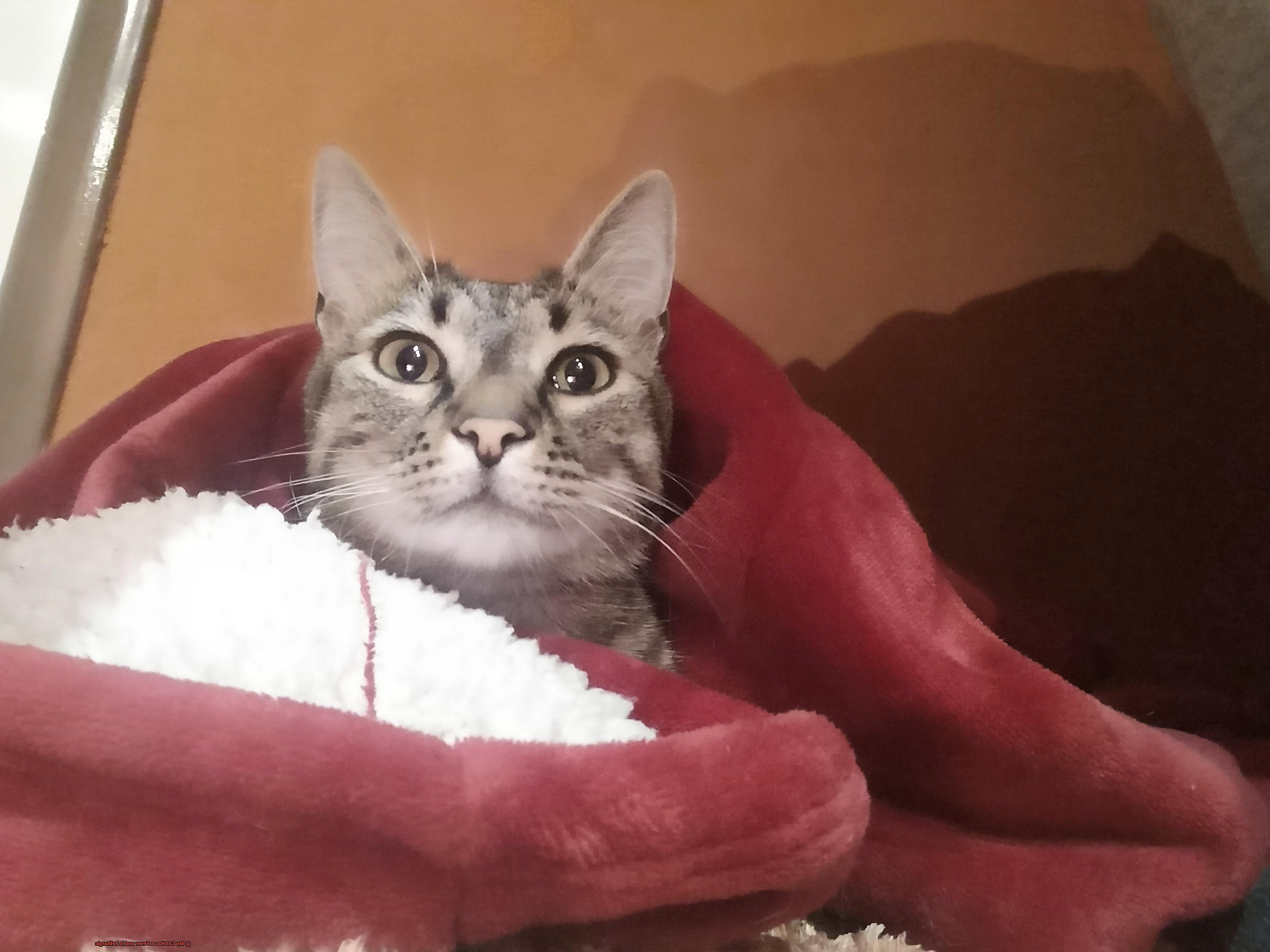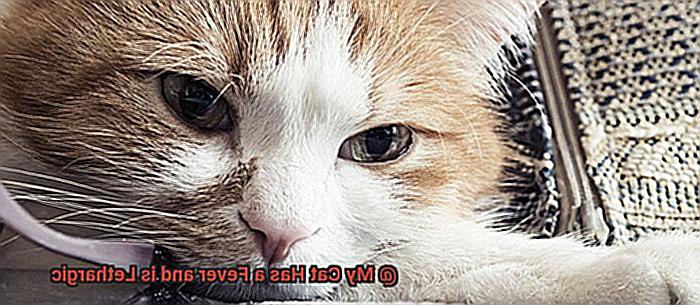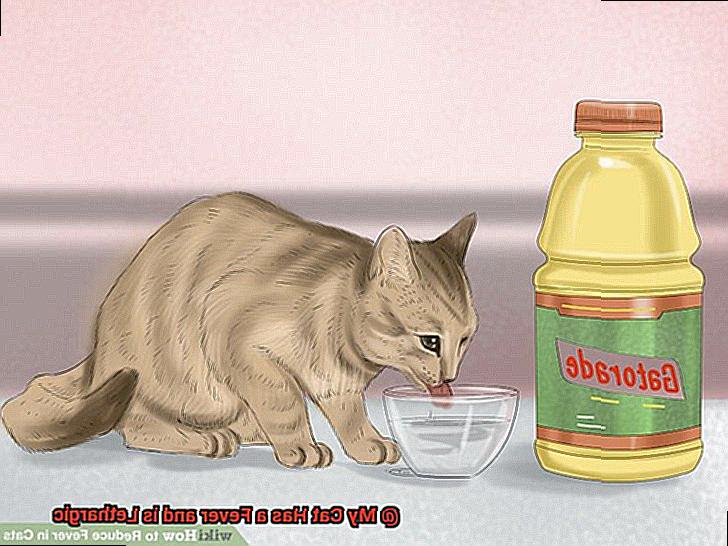As a devoted cat owner, it’s always unsettling when your feline friend seems under the weather. Perhaps they’re not as lively as usual, or they’re exhibiting signs of a fever. Observing your cat being lethargic is never a positive sign, and prompt action is necessary to guarantee that they receive the care they require.
There are numerous reasons why cats may develop a fever and become lethargic. It could be something minor or more severe, and without proper attention, it could quickly escalate. In this blog post, we’ll explore some of the possible causes of fever and lethargy in cats while also providing you with some practical measures to help your furry companion feel better.
From typical illnesses like upper respiratory infections to more serious conditions such as feline leukemia, several ailments can cause fever and lethargy in cats. By recognizing the symptoms early on and taking rapid action, you can assist your cat in feeling better and returning to their playful, happy selves. So let’s delve into how to identify when your cat has a fever and what steps you can take to ensure that they receive the best possible care.
How to Tell if Your Cat Has a Fever Without a Thermometer
Unfortunately, cats can sometimes fall ill with a fever, and it can be challenging to determine if they have one without a thermometer. But don’t worry, there are several signs you can look out for to determine if your cat has a fever.

Lethargy
One of the most common signs of a fever in cats is lethargy. If your cat is sleeping more than usual and seems disinterested in playing or exploring, they may be running a temperature. This is because their body is working hard to fight off whatever infection is making them sick.
Loss of Appetite
If your cat is not interested in eating or drinking, this could be another sign of a fever. When your cat’s body is fighting an infection, it needs all its energy to fight off the illness rather than digesting food.
Warm Ears and Nose
You can also check your cat’s ears and nose for signs of a fever. If their ears feel warm or hot to the touch or their nose is dry and warm instead of cool and moist, this could indicate that they are running a temperature.
Changes in Breathing or Heart Rate

Pay attention to any changes in your cat’s breathing or heart rate. These can both be affected by a fever and may become faster or more shallow than usual.
Shivering or Trembling
Another common sign of a fever in cats is shivering or trembling, which may indicate that your cat is experiencing chills.
It’s important to remember that these signs are not definitive and do not replace the use of a thermometer. If you suspect your cat has a fever, it’s best to take their temperature with a thermometer for an accurate reading. However, if you cannot get access to a thermometer or your cat is anxious around them, knowing these signs can help you determine if your cat needs veterinary attention.
What Causes Fever in Cats?
One of the most alarming symptoms of a possible health issue is a fever. But what exactly triggers this spike in body temperature in cats?
Contrary to humans, a fever in cats doesn’t always indicate an infection. In fact, several causes can lead to this condition, including cancer, autoimmune diseases, and heatstroke.
However, infections are still the primary cause of fever in cats. Bacterial, viral, and fungal infections can all make your cat’s temperature soar. Respiratory infections like feline herpesvirus and calicivirus are common culprits of fever in cats. Other infectious diseases that can lead to fever include urinary tract infections, skin infections, and abscesses.
Apart from infections, other factors can also trigger a fever in cats. Stressful situations such as traveling or changes in the environment can cause a stress response that results in an elevated body temperature. Traumatic injuries like broken bones or burns can also cause inflammation and result in fever.

Did you know that vaccinations can also cause mild fever in cats? Although rare, vaccines stimulate the immune system to produce an immune response that can sometimes result in a low-grade fever. This kind of fever is usually short-lived and doesn’t require treatment.
If you suspect that your cat has a fever, it’s crucial to consult your vet right away. Identifying the underlying cause of the fever is key to providing the right treatment for your feline companion. Don’t ignore signs such as lethargy, loss of appetite, warm ears and nose, changes in breathing or heart rate, and shivering or trembling.
How Long Does a Cat Fever Last?
Unfortunately, fevers can be an indication that something is not quite right in your cat’s body. But don’t worry – we’re here to help answer the question on every cat owner’s mind: how long does a cat fever last?
The duration of a cat’s fever depends on the underlying cause of the fever. If your cat’s fever is caused by a bacterial or viral infection, it can last for several days and may persist for up to a week or more. On the other hand, if the fever is caused by non-infectious factors such as stress or exposure to extreme temperatures, it usually lasts for a shorter period, typically one to two days.
To put it simply, imagine having a cold versus feeling overwhelmed from stress. A cold can linger for days or even weeks, while stress-induced symptoms may only last a short time.
But here’s the thing: even if your cat’s fever subsides on its own, it’s always best to seek veterinary attention if it lasts longer than two days. A prolonged fever could be an indication of a serious underlying condition that requires immediate medical intervention.
In some cases, your cat may experience recurring fevers, which could be indicative of chronic health issues. In these situations, it’s crucial to work closely with your veterinarian to identify the underlying cause of the fevers and develop a long-term treatment plan to manage the condition.
Remember to monitor your cat’s temperature regularly and seek veterinary attention if you notice any unusual symptoms or behaviors in your furry friend. With proper care and attention, most cats can recover from fevers and return to their happy and healthy selves in no time.
Can Stress Cause Fever in Cats?
When cats are under stress, their body produces cortisol, a hormone that weakens their immune system and makes them more susceptible to infections. As a natural defense mechanism, their body may raise its temperature to fight off infections.

Changes in a cat’s environment, loud noises, and routine changes are some common stressors affecting felines. If you suspect that your cat is experiencing stress, it’s essential to act promptly to reduce their anxiety levels. After all, a stressed-out cat is not only uneasy but also at risk of developing other health issues down the road.
To minimize stress levels in cats, pet owners can provide their furry companions with a cozy and secure environment equipped with plenty of hiding spots where they can retreat when they feel overwhelmed. Additionally, a consistent routine can help create a sense of stability and security for your cat. You can also use calming pheromone sprays or diffusers to create a soothing atmosphere for your furry friend.
It’s crucial to note that not all fevers in cats are due to stress. Therefore, before assuming that stress is solely responsible for your cat’s fever, it’s crucial to rule out any underlying medical conditions first. However, if you suspect that your cat’s fever is due to stress, addressing the underlying cause of their anxiety can prevent future health issues and improve their overall wellbeing.
It’s significant to monitor your cat’s behavior closely and take necessary steps to reduce their stress levels if required. This involves offering them a safe and comfortable environment, maintaining a consistent routine and using calming pheromones when necessary.
What To Do If Your Cat Has a Fever
One common indicator of an underlying health issue is a fever. A fever occurs when your cat’s body temperature rises above its normal range, indicating that their immune system is fighting off an infection or illness. Here are five reasons why it’s crucial to take action if you suspect that your cat has a fever:
A High Fever Can Be Indicative of a Serious Underlying Condition:
A high fever can signal a severe underlying health condition that requires urgent veterinary attention. Early intervention can improve your cat’s chances of recovery and prevent the situation from becoming dire.
A High Fever Can Cause Damage to Vital Organs:
If left untreated, a high fever can cause damage to your cat’s vital organs and even prove fatal. Taking prompt action can help prevent complications and ensure that your cat receives the necessary treatment.
Your Cat May Require Medication:
Your vet may prescribe antibiotics or other medications to help treat the underlying cause of the fever. Prompt treatment can help improve your cat’s chances of recovery and also prevent the illness from spreading to other parts of their body.
It Can Affect Their Appetite and Hydration Levels:
Fever can make your cat feel lethargic and less interested in eating or drinking. Encouraging them to stay hydrated and offering small amounts of food throughout the day is essential to keep their energy levels up and prevent dehydration.
Your Cat Needs Rest and Comfort:
A fever can make your cat feel uncomfortable and restless. Providing a warm, quiet place for them to rest and monitoring their temperature regularly can help them feel more comfortable and aid in their recovery.
It’s important to note that not all fevers require immediate medical attention. In some cases, with proper care and rest, most cats can recover from a fever within a few days to a week. However, it’s essential to monitor your cat’s symptoms closely and seek veterinary care if they do not improve or show signs of worsening. By taking prompt action and following your veterinarian’s recommendations, you can help your cat recover from a fever and get back to their normal happy self.
If you suspect that your cat has a fever, it’s crucial to take action and seek veterinary care promptly.
Can A Cat Recover From A Fever On Its Own?
Here’s what you need to know:
First, not all fevers require immediate veterinary attention. In fact, some mild fevers can resolve on their own as your cat’s immune system fights off the underlying infection or illness. However, it is crucial to keep a close eye on their symptoms and seek medical care if the fever persists or worsens.
If your furry friend is experiencing a mild fever and is still eating and drinking normally without any other concerning symptoms, they may recover within a few days on their own. Just like when we catch a cold, our bodies fight it off with rest and fluids. However, if your cat is lethargic, vomiting, or experiencing diarrhea or loss of appetite, it’s time to seek medical attention. A fever that lasts more than two days or reaches over 103°F also warrants an appointment with the vet.
It is important to remember that fevers are often just a symptom of an underlying issue. Therefore, while treating the fever may provide temporary relief, addressing the root cause of the fever is crucial for your cat’s overall health and recovery. Prompt veterinary care can also prevent further complications from arising.
While some cats may be able to recover from a fever on their own, closely monitoring their symptoms and seeking veterinary care if necessary is always the best course of action to ensure the best possible outcome for your furry friend. Remember to keep up with routine check-ups and vaccinations to prevent illnesses before they even start.

What Can You Do For A Cat With A Fever?
We all adore our adorable feline friends, but it can be distressing when they show signs of sickness. One common symptom that can cause alarm is a fever. But don’t worry. With the right care, your cat can bounce back from this pesky ailment.
The first and most important step is to consult with a veterinarian. They’ll be able to diagnose the underlying cause of the fever and recommend appropriate treatment options. In the meantime, there are a few things you can do at home to help your cat feel more comfortable.
Make sure your cat has access to fresh water at all times and offer small amounts of food frequently. You can also use a cool, damp cloth to gently wipe their forehead and paws. This simple gesture can do wonders in lowering their body temperature and soothing them.
While your cat is recovering, it’s crucial to keep a close eye on their behavior. If they’re feeling lethargic, encourage them to rest and avoid excessive activity. Monitor their appetite and water intake, as well as any other symptoms they may be experiencing.
If your veterinarian diagnoses an infection or illness as the cause of your cat’s fever, they may prescribe medication like antibiotics or antiviral drugs. In more severe cases, hospitalization may be required for more intensive treatment.

Remember, seeking professional veterinary care and following their recommended treatment plan is vital for your cat’s recovery. With proper care and attention, most cats are able to fully recover from a fever in no time. So don’t fret.
When Should I Worry About My Cat’s Fever?
But when your cat has a fever, it can be difficult to know what to do. A fever is usually a sign of an underlying issue in your cat’s body, which means it’s essential to monitor their behavior and health closely.

If your cat’s temperature rises above 103°F or remains elevated for more than two days, it’s time to seek veterinary attention. A high fever can cause severe complications, such as seizures, dehydration, and organ damage. In fact, think of it like an alarm bell that warns you something is not right inside your cat’s body.
Besides a high temperature, other symptoms to watch out for include vomiting, diarrhea, or difficulty breathing. If your cat shows any of these signs, it’s important to seek veterinary care immediately. Remember, quick action can prevent severe complications and ensure your feline friend receives the treatment they need to recover.
It’s also worth noting that recurrent fevers in cats can be a sign of an underlying health condition that requires medical attention. So if your cat’s fever keeps coming back, don’t delay seeking care. Your vet can help identify the root cause and provide effective treatment.
Your furry friend depends on you to keep them healthy and happy. If you notice any concerning symptoms or if your cat’s fever remains elevated for an extended period, don’t hesitate to seek veterinary care.
rR6aXt-bRGs” >
Conclusion
It can be worrisome when your furry companion is feeling under the weather. When your cat is experiencing lethargy and fever, it’s important to act quickly and seek veterinary attention to ensure they receive the proper care.
There are several signs that indicate your cat may have a fever, including loss of appetite, warm ears and nose, changes in breathing or heart rate, shivering or trembling. However, using a thermometer is the most accurate way to determine if your cat has a fever.
Fevers in cats can be caused by various factors such as infections, stress, traumatic injuries or vaccinations. It’s important to identify the underlying cause of the fever through consultation with your vet to provide the best treatment for your feline friend.
While some mild fevers may resolve on their own as your cat’s immune system fights off the infection or illness, not all fevers should be left untreated. Close monitoring of their symptoms and seeking veterinary care when necessary is always recommended for the best outcome.
At home, you can help make your cat more comfortable by offering fresh water and small amounts of food frequently. Additionally, using a cool damp cloth to wipe their forehead and paws can provide relief from any discomfort.
Remember that professional veterinary care and following their recommended treatment plan is crucial for your cat’s recovery.







